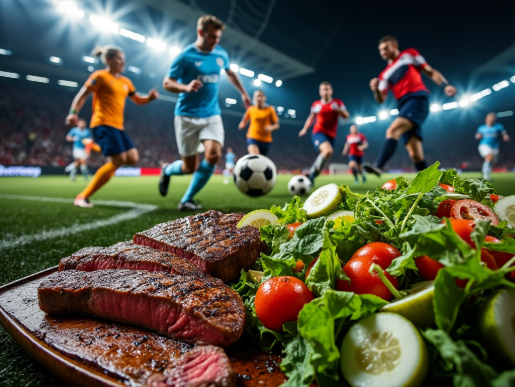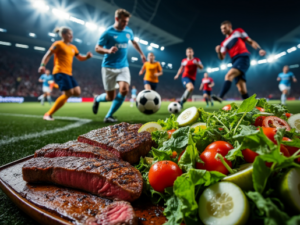As a soccer player, your performance on the field is not just about training hard; it’s about fueling your body with the right nutrients. A balanced diet plays a crucial role in enhancing your energy, endurance, recovery, and overall performance. Here’s why maintaining proper nutrition is essential for reaching your peak as an athlete.
Fueling Your Energy Needs
Soccer is a demanding sport that requires high levels of energy. Matches and training sessions involve continuous movement, sprinting, and quick decision-making. Carbohydrates are your body’s primary source of energy. Complex carbohydrates such as whole grains, fruits, and vegetables provide sustained energy, while simple carbs can offer a quick boost when needed. Incorporating the right balance ensures you’re ready to give your best, from the first whistle to the final minute.
Building and Repairing Muscles
Soccer players constantly put their muscles under stress. Protein is essential for muscle repair and growth. Including lean sources like chicken, fish, eggs, and plant-based options such as lentils or tofu can aid in recovery and prepare your body for the next challenge. A diet lacking in protein can lead to slower recovery times and an increased risk of injury.
Staying Hydrated
Proper hydration is often underestimated but is vital for optimal performance. Dehydration can cause fatigue, reduce coordination, and impair decision-making on the field. Soccer players should aim to drink water regularly throughout the day, and consider electrolyte-rich drinks during intense sessions or hot weather to replenish lost minerals.
Supporting Recovery with Micronutrients
Vitamins and minerals are the unsung heroes of athletic performance. Iron helps transport oxygen to your muscles, while calcium and vitamin D are key for strong bones. Foods like leafy greens, nuts, dairy, and fortified cereals should be staples in your diet. Antioxidant-rich foods, such as berries, help combat inflammation and support recovery after rigorous training.
Timing Matters
What you eat and when you eat it can impact your performance. Eating a balanced meal 2-3 hours before training or a match ensures your body has enough time to digest and convert food into energy. Post-game or post-training meals should prioritize protein and carbs to replenish glycogen stores and aid in muscle recovery.
Avoiding Processed Foods
Processed and junk foods can be tempting, but they often contain unhealthy fats, excessive sugar, and empty calories. These can lead to sluggishness, weight gain, and reduced athletic performance. Opt for whole, natural foods that provide the nutrients your body needs to thrive.
The Role of Individualization
Every player is unique, and dietary needs can vary based on age, gender, position, and training intensity. Consulting a sports nutritionist can help tailor a plan to suit your specific requirements, ensuring you perform at your best.
The Bigger Picture
A balanced diet does more than improve physical performance; it also supports mental clarity, focus, and resilience. Soccer is as much a mental game as it is physical, and proper nutrition ensures your brain functions at its best under pressure.
Conclusion
To excel on the soccer field, it’s crucial to view food as fuel for your body and mind. By maintaining a balanced diet rich in carbohydrates, proteins, healthy fats, vitamins, and minerals, you can maximize your potential and reduce the risk of injury. Remember, success on the field starts with the choices you make in the kitchen. Prioritize nutrition, and watch your game elevate to new heights.






